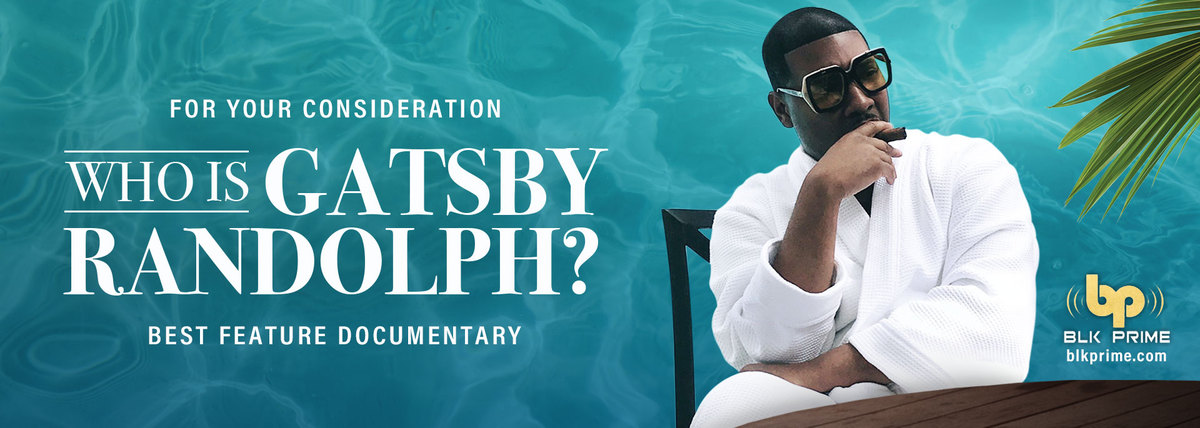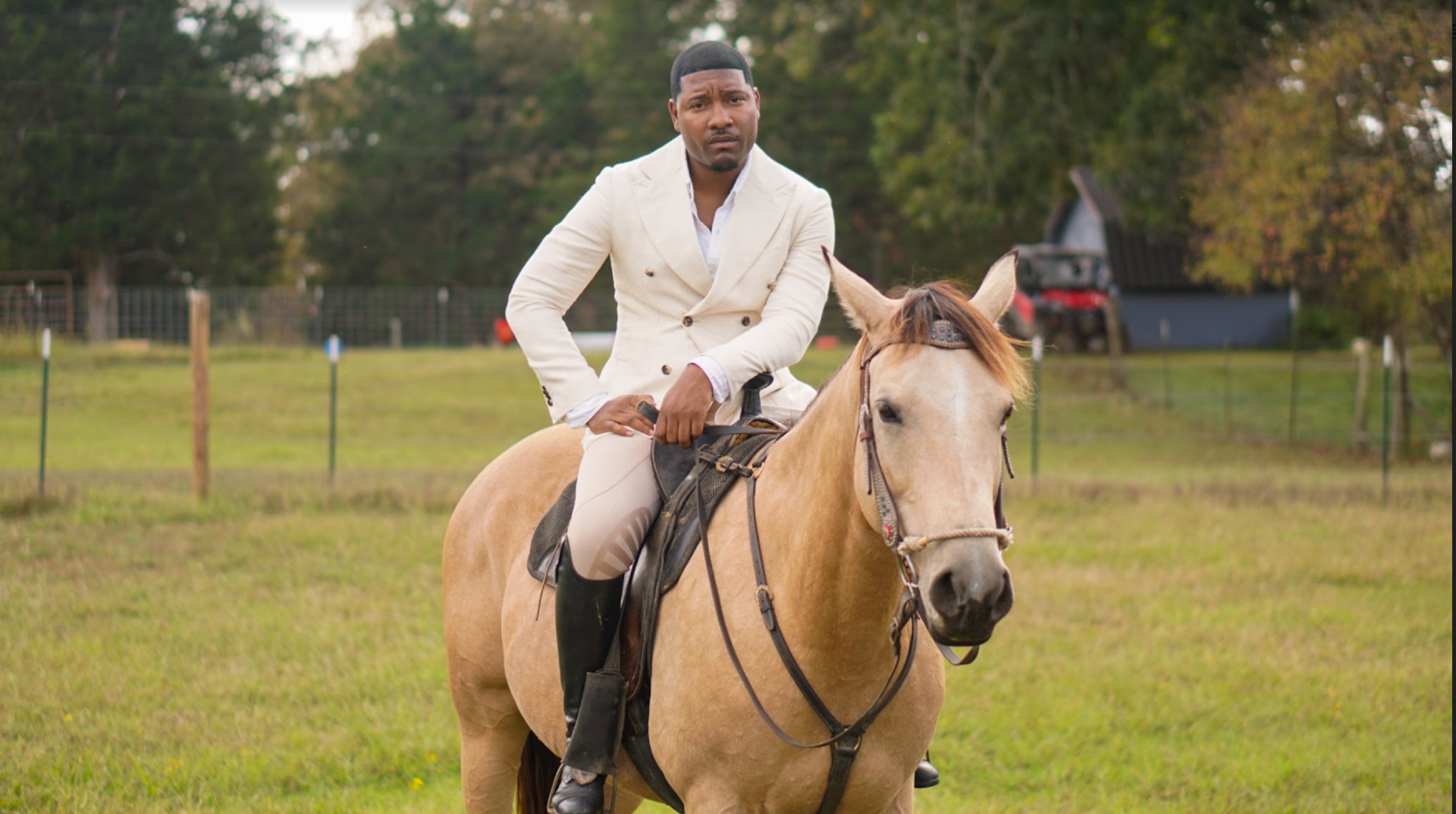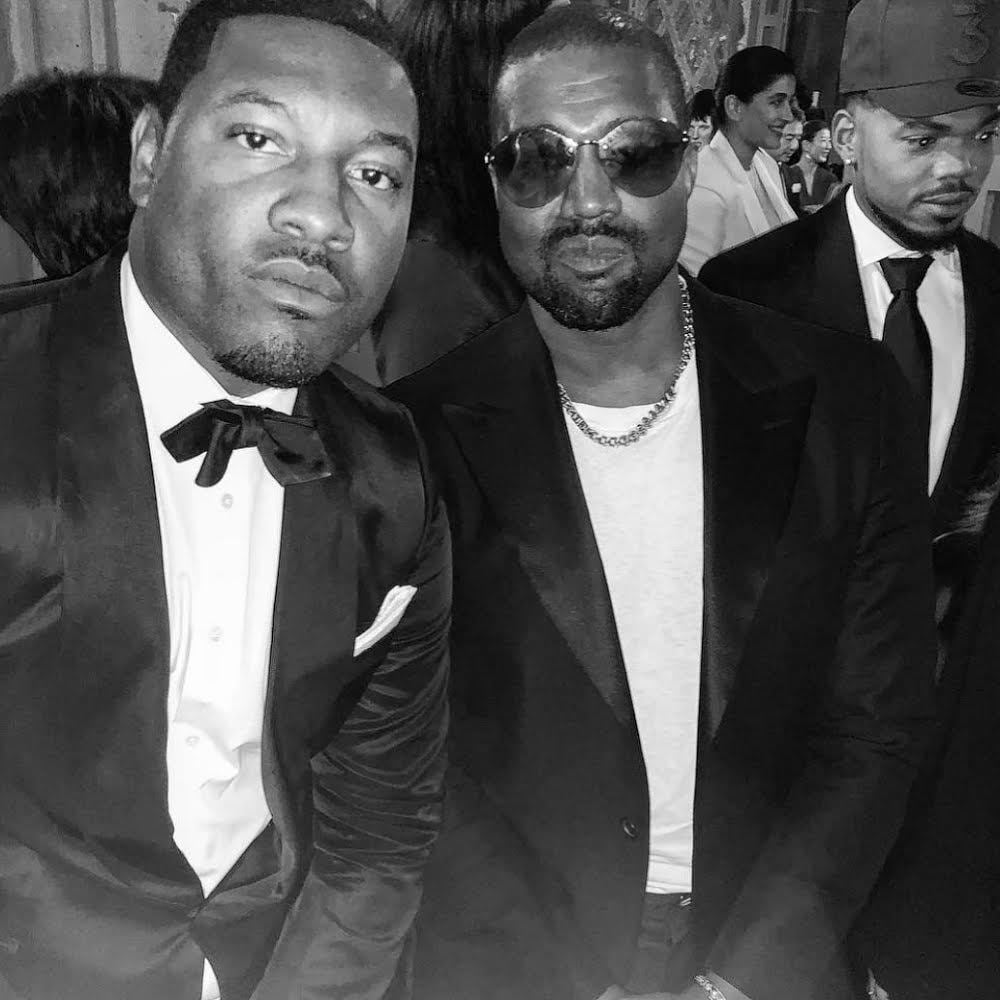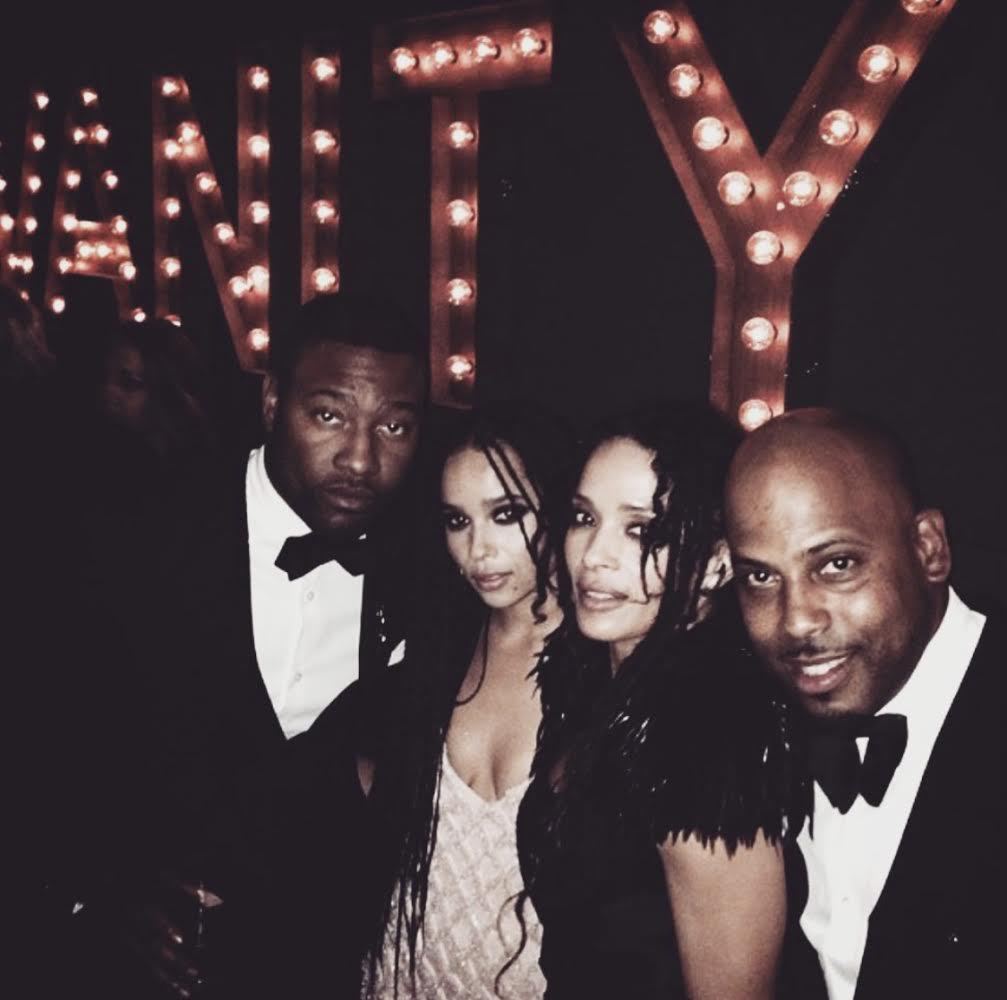
Truth and talent: Get to know filmmaker Gatsby Randolph
Gatsby Randolph knows how to make an entrance. The Hollywood upstart burst onto the scene in 2013 and managed to rub shoulders with some of the biggest figures in the industry, including JAY-Z and Jimmy Kimmel. How did he do it? Well, that question gets a fascinating answer with the new documentary Who Is Gatsby Randolph?.
Gatsby Randolph is the slight alter ego of Kobie Randolph, who wrote, produced, acted, edited, and co-directed the documentary with Marcus Turner. He takes audiences on a journey that’s simultaneously funny, thought-provoking, and inspiring. Who Is Gatsby Randolph? was recently picked up for worldwide distribution by BLK Prime.
Film Daily had the singular pleasure of talking to Gatsby Randolph about his meteoric rise, his creative process, and his advice for aspiring filmmakers.

Tell us about your history in filmmaking. How did you start your journey?
Originally I was a serial entrepreneur who wanted to be in hip hop. I was a DJ and nightclub owner at age 22. Eventually I got into artist management, and I knew I wanted to be in entertainment, I didn’t really know I was going to wind up in film and TV.
So this is my debut project. It was inspired because I wanted to see a movie about something I was very interested in. I was very interested in the blueprint of how to make it in Hollywood. So that’s what initially took me on this journey.
How crucial is self-motivation to succeeding in the film industry?
You have to be your number one cheerleader, because everyone’s going to think you’re crazy. Especially if you don’t have the tangible assets that most film studios have. For example, if you don’t have the big budget, the press releases, being in development, if you don’t have any of the indicators that the public is used to seeing, well, you have to be your biggest cheerleader, because they’re not going to believe it.
The truth of the matter is, who cares if they believe it or not? As long as you know, it’s true. As long as you believe in your vision, and you know that you have the tools to pull it off. You just have to have tunnel vision during the whole process, and just keep focused on your truth, your talents, that this is going to be a hit once it gets done. Then the person who everyone calls crazy at the end is a genius.
You recently wrote, co-directed, and acted in the documentary Who Is Gatsby Randolph?. How did the idea for the doc come about?
I came up with the idea for the documentary after looking at all of my social media. I started to notice in my real life, because unlike any other film, I’m the real character and this is not a story that’s based off of a true story, it is a true story. As I was looking, I knew I had this story in my head, based off of my real-life experiences.
While watching the movie Bowfinger I realized that I can make a real movie like that, based off of my social media content. The things that I didn’t capture on social media, the story was still there, I just didn’t have the scenes. Maybe I had a picture or a couple of live shots. What if I just go back, put those same clothes on and relive my life? So go back to whatever event took place, and relive that moment and reenact that.
Once I put all that together, I realized that not only did I make a documentary that played in real time, like a movie, I made the first reality movie, and I owned all the content. The reason I decided to play myself is because once it filed as a documentary I would own all the content, even with the major celebrities and locations I shot outright.
The Gatsby Randolph alter ego is an exaggerated version of your real self, Kobie Randolph. How similar would you say the two personas really are?
That’s really me. When people watch this, they’re going to say, “Oh, wow, maybe that’s amazing acting.” but honestly, that’s me. I did like putting the alter ego there because maybe people weren’t ready for how crazy I am. So putting this alter ego gives me something to hide behind. Or if the character got out of control, at least I have a buffer. All the things that you saw and things that I didn’t even put on here, that’s really me to a certain extent. Gatsby is a piece of me that exists.

Does acting under the guise of an alter ego allow you to feel more bold or open to different ideas?
Yes, it does.
There have been some docs that deconstruct celebrity and fame. Did you pull influence from any other films when making Who Is Gatsby Randolph?
More than me, it’s my imagination. So Gatsby Randolph is a fragment of Kobie Randolph’s imagination based on themes and ideas that I saw growing up. Whether that be The Fresh Prince of Bel-Air, Steve Urkel turned into Stefan, my grandfather and his white dinner jacket listening to Nat King Cole and Frank Sinatra, or Eddie Murphy; all those put into the ultimate Hollywood personification that’s Gatsby Randolph.
There’s a comedic tone that runs throughout Who Is Gatsby Randolph?. How much of the humor was in your script and how much was improvised during filming?
It was a lot in and mind you I had only written one thing before. I wrote a book that was based on my teenage years called The Champagne Life. The movie pretty much picks up with a book left off. A lot of a lot of the tone was really improvised. I would write the skeleton of what it would be and then when I got into the scene improvise. So probably 50% of this is being improvised and then 50% of it was actually scripted that way.
The comedy in the film is balanced out with genuinely heartfelt moments. How difficult was it to balance these two extreme tones and make them feel natural?
The balance between the comedy in the heartfelt moments, that was just real life. Think that life in general is very funny, sad, it’s triumph, sacrifice, celebration. All of that is a part of life. To get that I don’t think that there was a special formula to come to that it was a matter of me being truthful and being as vulnerable as possible. I think if we’re vulnerable and we’re truthful about the natural events of life, then will you get all those beats back.

The film chronicles your trip to an Oscar party, where you rubbed shoulders with celebrities like JAY-Z and Jimmy Kimmel. What was that experience like?
When I go to the Oscar party in the film, and I’m rubbing shoulders with, you know, the JAY-Zs and Jimmy Kimmels, what was that, like? It was like my life. The difference between this and Borat was that it wasn’t a first-time encounter.
It wasn’t a situation where it was a rubbing shoulders at all, it was me just really living my life and to accomplish a goal. The thing with JAY-Z was that I was trying to close a business deal, so I had met him 10 times prior to that night.
I think the surreal moment was everyone thinking I had won an Oscar. So when people ask “What was the experience like on Oscar night?” well, everyone thinks I won an Oscar. So the ironic part is, my friend who was with me that night, Sean [Harley] and I may be the people who know what it’s like to win an Oscar and we’ve never won an Oscar before. But we know all of the feelings, the congratulations, the perks of feeling like you won an Oscar that night.
You are the mastermind behind Who Is Gatsby Randolph?. Did you ever find it difficult to juggle your duties as writer, co-director, and star?
Yeah, it was very difficult to juggle being a writer, director, costar, and editor. Every piece of this movie I had my hands on, because a lot of the story was in my head, even though I had a script.
It was hard to get people to buy in early on this because I did sound unbelievable. So the main thing was being close enough to it, to understand it, but having the discipline to distance myself to see it from a different vantage point. It took me a long time to do that. I always say it took me three years to learn how to play myself.
It took me three years to learn how to be an unbiased actor in an unbiased storyteller for this story. That was quite a challenge.
You co-directed the film with Marcus Turner. What made you take on a collaborator for this particular project?
I co-directed with Marcus Turner, because he was like the director who knew all the technical things. He did; he’s doing everything like the new Hype Williams. He watches every music video right now and he knows the things traditionally taught from film school to make a film. I didn’t even know I was directing until I was two years into making this movie in a four-year process.
I just knew what I wanted it to look like. I wanted the actor to stand like this, I wanted this camera angled, I want you to catch the sunrise, or it should pan and slow like that. I knew what I wanted but he actually knew the technical things. I know what it should feel like and look like but I just needed the professional acumen on board to help me pull that vision together.
Have you worked with mentors in the past? How would you recommend people go about finding them?
Yeah, I worked with several mentors in the past, one of them being Tom Noble. Tom Noble is a film and editing legend. Tom Noble has won an Oscar so once I took the project to him as a rough cut and he thought it was brilliant, I knew that we have something here. I looked up to older people who had done this process before. They started saying you may have something here and that’s why I kept going.
Who Is Gatsby Randolph? is being distributed by BLK PRIME. What made them the right production banner to handle the documentary?
The main reason I am with BLK PRIME was because there was a new platform that believes in giving young creatives the freedom to bring their projects to light from start to finish. I was very concerned about going to a bigger or more established distribution house, and then they try to take control. I think this project is very sensitive as far as the narrative and the marketing that we put out to the world.
The gold in this project is the organic, bootstrap, grassroots effort that has got it here and I think it needed to be distributed in the same way. So I thought BLK PRIME was a perfect match and believed in that same vision.
Can viewers expect to see Gatsby Randolph return in a future adventure?
Absolutely. I’m working on Part Two right now of the Gatsby series, and then Gatsby Randolph will be in transmedia. Meaning you’ll see Gatsby Randolph as Gatsby Randolph, other TV shows, and other movies that aren’t Who Is Gatsby Randolph? sequels, just other films.
I always say Gatsby Randolph is going to be acting like Tupac. He was never Tupac the bus driver, he was just Tupac. So that’s sort of Gatsby Randolph. I sort of see it coming to life.
What’s your mission as a filmmaker? Name the most important thing you want viewers to experience when watching your projects.
My number one mission as a filmmaker is to create funny, sexy, and smart films for people of color. I feel like there should be more black Ocean’s 11 or Sex and the City. I think that the African American films that we’ve been accustomed to seeing all tell a similar story. We’ve seen the slave story, and appreciate it but we’ve seen it.
We have seen the boys in the hood story, but I want to see different aspects of people of color and diversity doing other things that make life and make the world full. When it comes to something that’s a lifestyle film ie. sexy, funny, looks good, feels good that is the type of film I want to make.
Who are the artists that inspire you the most?
My top three would be Stevie Wonder, Frank Sinatra, and actually a photographer called Slim Eretz. He photographed Hollywood, high society Hollywood, and South of France. He did a lot of photos in the 50s and 60s. Slim Eretz photos really inspired me today.

What has been your greatest success?
My greatest success has been getting this film completed. This is the film that on paper, there hasn’t been any other film like it. No other film was shot at the locations that this film was shot at – the Grammys, Oscars, Emmys, Sundance Film Festival, the Golden Globes, and the people who are in it – Jeff Bezos, JAY-Z, Beyonce, Jimmy Kimmel, JLo, Leonardo DiCaprio, Stevie Wonder, I mean, the list goes on.
All of these A-Listers in a film with the main star being someone you’ve never heard of before with it all being real and all being true. So just finishing the film is my greatest accomplishment.
How about your biggest failure? What did you learn?
My biggest failure probably was opening up a nightclub when I was 22 years old in college in Nashville, Tennessee. The reason why I call it my biggest failure was because I was trying to change a culture. The nightclub was before its time. In Nashville now you think of a big metropolitan market, but back then it wasn’t.
I had all these ideas from LA, New York, and South Beach but I should have spent that time just going to where the market was versus trying to change the culture in Nashville. I should have put that energy in just going with the wave instead of fighting the wave. The biggest lesson is don’t fight, don’t fight the marketplace, just go to where it’s fertile, and then you’ll be successful.
Can you tell us about any upcoming projects?
I’m doing this one called PYT. And PYT is Pretty Little Thing. It will be like an African American diversity remake of Pretty Woman. If you have ever seen Richard Gere and Julia Roberts in Pretty Woman, this is the modern day version of that. While keeping the setting in Beverly Hills and keeping it very classy and classic nostalgic feel but in modern day.
What advice do you have for aspiring filmmakers?
Never let anyone tell you no. Do something every day to push towards your goal is really the power of execution. You don’t know where your project is going to be three months from now, if you start, but I guarantee you starting and doing something will take you to your next step, your next step, your next step, and then you look up and boom projects are done. It’s getting ready to come out.



